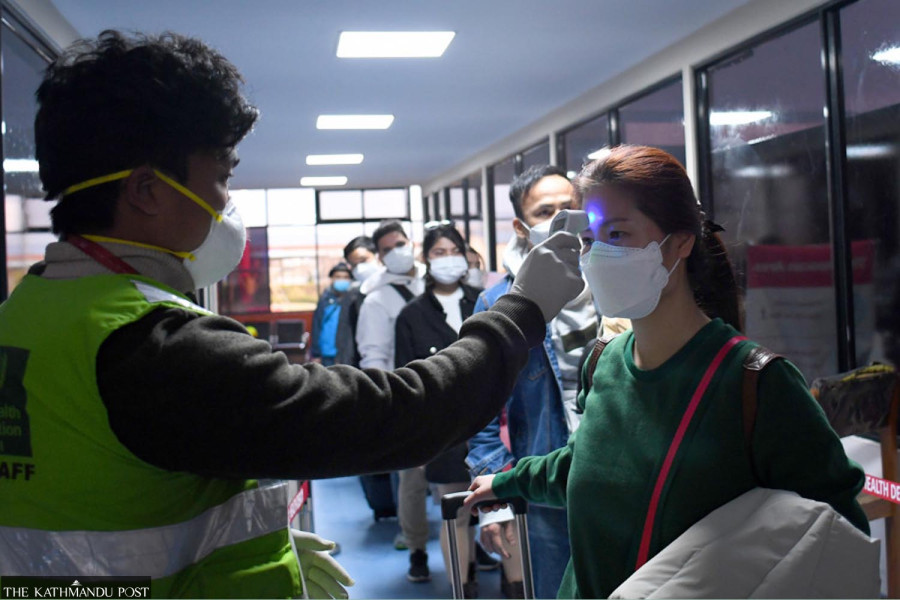Health
As Covid surges in Japan and Korea, calls grow for close surveillance
Thousands of Nepali students and migrant workers in the East Asian nations keep travelling back to Nepal.
Arjun Poudel
A new worry has gripped those deployed at the Tribhuvan International Airport health desk: why has no new alert been sounded by the agencies concerned despite Japan and South Korea reporting a rapid surge in Covid cases of late?
There are direct flights to Kathmandu from both the countries, where thousands of Nepali migrant workers and students live and keep travelling back home to Nepal.
“We have received no new directive from the Ministry of Health and Population,” said a health worker deployed at the TIA health desk asking not to be named, as he is not authorised to speak to the media. “We seek QR [quick response] codes or negative results of polymerase chain reaction tests and let people enter the country.”
Several countries, including South Korea and Japan, where Nepal has a high mobility rate, have been witnessing massive spikes in Covid infections. South Korea on Tuesday recorded 87,759 new cases and 56 deaths on Tuesday. Japan recorded 185,694 cases and 231 deaths on the same day. China reported 2,722 new cases and five deaths.
According to the Department of Immigration, in November alone, the number of arrivals from Japan was 955 while 1,015 left for the country from the Kathmandu airport. Similarly, there were 1,670 arrivals from South Korea and 1,616 departures to the country from Kathmandu in the same month.
Doctors say that even the fully vaccinated and those who already have been administered booster shots and who also have QR codes can get infected with the virus and pass it on to others.
Of late, Nepal has been witnessing a rapid decline in new Covid infections. The country reported zero cases on Friday and Sunday. The Health Ministry reported six cases of the coronavirus infection on Tuesday. Active cases rose to 19 on Tuesday from 11 on Sunday, which are still among the lowest daily tallies since the first wave of pandemic hit the country in 2020.
Experts in Nepal say that even if new cases have declined significantly, infection might have been spreading in communities.
Case detection has declined, as only the relatively healthy people looking to leave the country or returning from abroad are undergoing coronavirus testing, experts added.
“Even if new cases have declined significantly, there is a risk of a new surge,” said Dr Biraj Karmacharya, an epidemiologist. “We should not be too worried, but vigilance should still be high.”
Authorities stopped tracking active cases months ago. Experts say the coronavirus is continuously mutating.
Nepal has recently reported Omicron’s new sub-variant BM.1.1.3, which is another descendant of highly transmissible Omicron’s sub-variant BA.2.
Along with BM.1.1.3, BA.2.75.1, BA.2.75.2 and BA.2.75.3 have been detected in swab samples in whole-genome sequencing.
Whole-genome sequencing is a comprehensive method of analysing the entire DNA sequence of an organism’s genes. Researchers say that whole-genome sequencing of the coronavirus could be instrumental in tracking the severity and properties of the virus.
Nepal has reported almost all variants and sub-variants of Covid detected abroad. Due to the high mobility of people across the globe, the risk of a virus variant entering the country remains high, say the doctors.
“The uptake of booster shots is very low in our country and it's been around a year since many people took them,” said Karmacharya.
“It could be too late to wait for a new surge in order to ramp up the booster drive. Authorities should do everything possible to increase the uptake of booster doses.”
The Health Ministry decided to administer second booster shots months ago, but it is yet to implement the decision.
Officials at the Health Ministry said that they are aware of a new Covid surge in countries like Japan and South Korea, and are in close contact with international health agencies.
“We will step up surveillance measures and closely monitor the international situation,” said Dr Samir Kumar Adhikari, joint spokesperson at the Health Ministry. “A new surge may come in the coming days, but that doesn't mean that we should start worrying.”




 9.83°C Kathmandu
9.83°C Kathmandu















